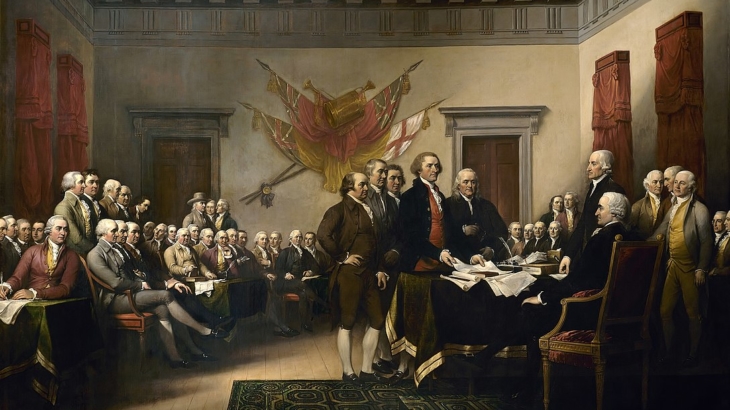Keeping a Free People Securely Bound Together Through the Principle of Natural Law Opposition to Tyranny
 Essay Read by Constituting America Founder, Actress Janine Turner
Essay Read by Constituting America Founder, Actress Janine Turner
August 1, 1776, Samuel Adams said in his Speech on American Independence,
“When the law is the will of the people, it will be uniform and coherent: but fluctuation, contradiction, and inconsistency of councils must be expected under those governments where every revolution in the ministry of a court produces one in the state. Such being the folly and pride of all ministers, that they ever pursue measures directly opposite to those of their predecessors…We shall neither be exposed to the necessary convulsions of elective monarchies, nor to the want of wisdom, fortitude, and virtue, to which hereditary succession is liable. In your hands it will be to perpetuate a prudent, active and just legislature, and which will never expire until you yourselves lose the virtues which give it existence…Our Union is now complete; our constitution composed, established, and approved. You are now the guardians of your own liberties.”
These words of Samuel Adams justifying the pursuit of American independence represent a view among patriots in Boston that rejected hereditary monarchy in favor of representative or republican government. Adams founded his arguments upon a belief that the legitimate purposes and limitations of civil government could be discerned from an understanding of the laws of nature and natural rights. This view of government, however, had been developing and spreading in the public mind – especially in Boston – for well over a decade prior to the Declaration of Independence.
Bostonians heard these arguments with growing frequency in sermons at their places of worship after the British began to impose oppressive taxes and regulations in the 1760s. Abraham Williams, for example, a Congregationalist pastor in Sandwich, Massachusetts, incorporated a teaching on the laws of nature in his Election Sermon in 1762.[1] Mankind needs government, Williams preached, in order to secure the blessings that God has bestowed upon them. “[W]hen Men enter into civil Societies, and agree upon rational Forms of Government,” Williams said, “they act right, conformable to the Will of God, by the Concurrence of whose Providence, Rulers are appointed…The End and Design of civil Society and Government, from this View of its Origin, must be to secure the Rights and Properties of its Members, and promote their Welfare.” Williams taught that rulers, therefore, must do good, not harm to their subjects. “ In all Governments, Magistrates are God’s Ministers, designed for Good to the People. The End of their Institution, is to be Instruments of Divine Providence, to secure and promote the Happiness of Society.”
The truth of this view, Williams argued, was conclusively demonstrated by the laws of nature. “The Law of Nature (or, those Rules of Behaviour, which the Nature God has given Men, the Relations they bear to one another, and the Circumstances they are placed in, render fit and necessary to the Welfare of Mankind),” Williams continued, “is the Law and Will of the God of Nature, which all Men are obliged to obey.”
Pastor John Tucker of Newbury, Massachusetts, continued to build on this argument in an election sermon in 1771, adding that according to the Laws of Nature, governors rule by the consent of the people. “All men are naturally in a state of freedom,” said Tucker, “and have an equal claim to liberty. No one, by nature, nor by any special grant from the great Lord of all, has any authority over another. All right therefore in any to rule over others, must originate from those they rule over, and be granted by them.” The idea of rule by consent through a social compact also implied that are just limits to what government may do, and also obligations that government must perform.
“Whatever authority therefore the supreme power has, to make laws, to appoint officers, etc. for the regulation and government of the state, being an authority derived from the community, and granted by them,” Tucker concluded, “can be justly exercised, only within certain limits, and to a certain extent, according to agreement.”
In his 1776 sermon titled “On the Right to Rebel against Governors” – another election day sermon in Boston – Samuel West argued that, according to the Laws of Nature, rulers who act contrary to God’s will that the rights of the people be secured from harm may be – and in fact should be – justly resisted and opposed by citizens. “[T]yranny and arbitrary power are utterly inconsistent with and subversive of the very end and design of civil government,” West preached, “and directly contrary to natural law, which is the true foundation of civil government and all politic law. West continued:
“Consequently, the authority of a tyrant is of itself null and void; for as no man can have a right to act contrary to the law of nature, it is impossible that any individual, or even the greatest number of men, can confer a right upon another of which they themselves are not possessed; i.e., no body of men can justly and lawfully authorize any person to tyrannize over and enslave his fellow-creatures, or do anything contrary to equity and goodness. As magistrates have no authority but what they derive from the people, whenever they act contrary to the public good, and pursue measures destructive of the peace and safety of the community, they forfeit their right to govern the people.”
West’s argument that rulers who act without consent and contrary to the good of society are illegitimate aligns with many of the same arguments Samuel Adams made in his speech on independence. Adams’ message was widely agreed to in part because it was an argument Bostonians had been hearing and working toward putting into practice for well over a decade. It was a view that would be carried beyond Massachusetts as Americans in other states fought to win an then maintain American independence from British rule.
 Christopher C. Burkett is Associate Professor of History and Political Science, and Director of the Ashbrook Scholar Program at Ashland University.
Christopher C. Burkett is Associate Professor of History and Political Science, and Director of the Ashbrook Scholar Program at Ashland University.
[1] This and the following sermons are available from https://oll.libertyfund.org/title/lutz-american-political-writing-during-the-founding-era-1760-1805-vol-1.
Click here for First Principles of the American Founding 90-Day Study Schedule.
Click here to receive our Daily 90-Day Study Essay emailed directly to your inbox.




Join the discussion! Post your comments below.
Your feedback and insights are welcome.Feel free to contribute!